 Petzlover
Petzlover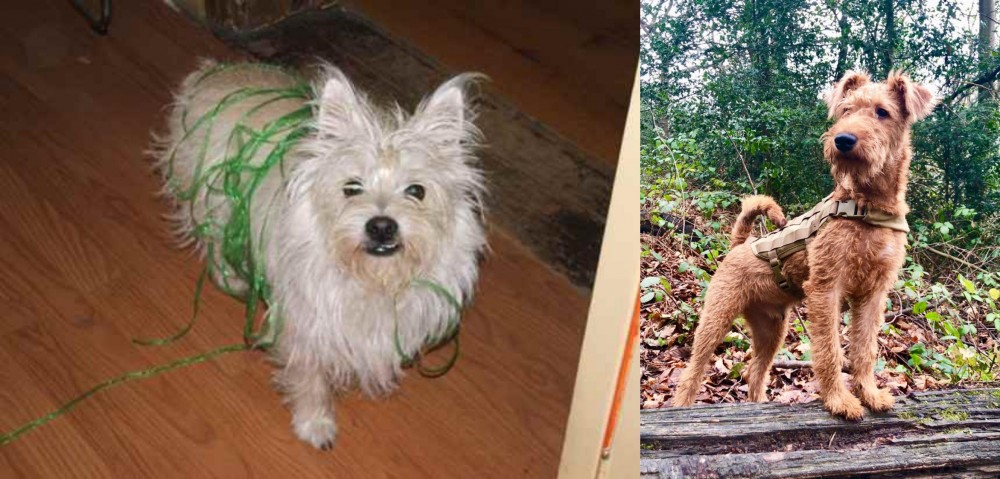 Cairland Terrier is originated from United Kingdom but Irish Terrier is originated from Ireland. Cairland Terrier may grow 17 cm / 6 inches shorter than Irish Terrier. Both Cairland Terrier and Irish Terrier are having almost same weight. Both Cairland Terrier and Irish Terrier has almost same life span. Cairland Terrier may have more litter size than Irish Terrier. Cairland Terrier requires Low Maintenance. But Irish Terrier requires Moderate Maintenance
Cairland Terrier is originated from United Kingdom but Irish Terrier is originated from Ireland. Cairland Terrier may grow 17 cm / 6 inches shorter than Irish Terrier. Both Cairland Terrier and Irish Terrier are having almost same weight. Both Cairland Terrier and Irish Terrier has almost same life span. Cairland Terrier may have more litter size than Irish Terrier. Cairland Terrier requires Low Maintenance. But Irish Terrier requires Moderate Maintenance
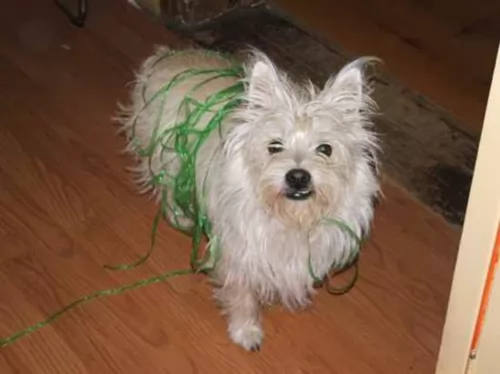 The Cairland Terrier is a cross between the Cairn Terrier and the West Highland White Terrier. It simply means that if you own a Cairland, you’re going to get a little bit of each dog in him.
The Cairland Terrier is a cross between the Cairn Terrier and the West Highland White Terrier. It simply means that if you own a Cairland, you’re going to get a little bit of each dog in him.
This hybrid is a new breed which means you’re not going to get too much documented history on the dog. A tough little hunter of fox and otter, the Cairnland is thought to hail from Scotland.
 The Irish Terrier is a dog breed from Ireland and one of the many different terrier breeds there are.
The Irish Terrier is a dog breed from Ireland and one of the many different terrier breeds there are.
Nobody is too sure of the Irish Terrier's history but it is one of the oldest terrier breeds. It appears as if the dog breed was developed from a wheat colored terrier and the extinct black and tan terrier.
It was always a common practice to crop the ears of terriers, but in 1889 the Irish Terrier Club required that the ears remain uncropped. The first Irish Terrier was shown in 1881, and the first Irish Terrier registered with the American Kennel Club was in 1885. The Irish Terrier Club of America was founded in 1896.
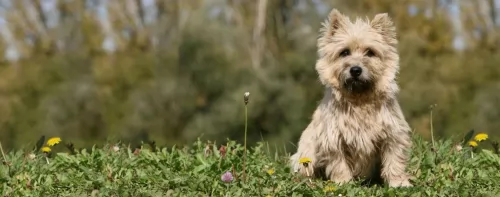 The Cairland Terrier is a small dog standing anything between 20 and 35cm in height and weighing in at roughly 4 to 10kg. He has short legs, a compact little body, while being muscled and strong. He has small erect ears with a shortish upright tail.
The Cairland Terrier is a small dog standing anything between 20 and 35cm in height and weighing in at roughly 4 to 10kg. He has short legs, a compact little body, while being muscled and strong. He has small erect ears with a shortish upright tail.
The color of the medium length coat can be fairly varied which means brown, black, cream, fawn, brindle or even white from the Westie. The dog has two coats with the topcoat being fairly harsh, coarse and straight to slightly wavy while the undercoat is soft.
When it comes to temperament, the Cairland Terrier is social and feisty with a high self-esteem. He has a strong personality and can be somewhat stubborn but he is a great friend of children in the home. He just loves to take part in all their games.
With training and socialization which he undergoes easily, he will get on well with other pets too, although he can become aggressive with other dogs in his territory.
 The Irish Terrier is a medium sized dog who stands between 45cm and 50cm and weighs in the region of 11 to 12kg. He has a short, dense, wiry double coat which is a red, golden, sandy, wheaten color.
The Irish Terrier is a medium sized dog who stands between 45cm and 50cm and weighs in the region of 11 to 12kg. He has a short, dense, wiry double coat which is a red, golden, sandy, wheaten color.
The ears of the dog are semi-erect/semi-floppy and the tail is held high and curved.The chest is deep and muscular and the front and back legs are strong, long and muscular.
The Irish Terrier is a companion dog today, even though he was once a guard- and hunting dog. He is an amicable dog while also being alert and active. He is also independent and strong-willed so he will require training and socialization as then he becomes obedient and relaxed and much easier to live with.
They're social dogs too, loving all the members of their human family, getting on well with children in the home.
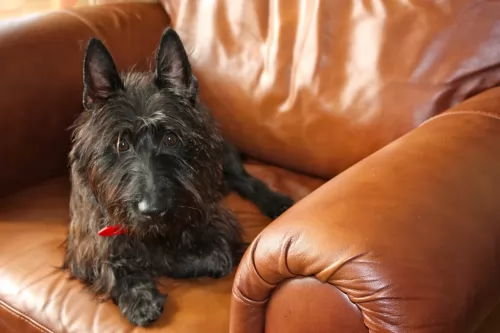 Terriers are dogs that are full of character and self-confidence, and your Cairland Terrier is no different. These small dogs in the Terrier group don’t actively look for a fight with other dogs, but if they are provoked, they aren’t intimidated and will give bigger dogs a piece of their mind. They make splendid pets and will always be ready for a game.
Terriers are dogs that are full of character and self-confidence, and your Cairland Terrier is no different. These small dogs in the Terrier group don’t actively look for a fight with other dogs, but if they are provoked, they aren’t intimidated and will give bigger dogs a piece of their mind. They make splendid pets and will always be ready for a game.
Make sure that your Cairland Terrier remains the feisty little character he is by making sure he gets well looked after. Dogs aren’t known as man’s best friend for nothing, and in exchange for the care you give your Terrier, you’ll be rewarded by a loyal and devoted friend.
 Irish Terriers are good with people and want to be an active member of their human families.
Irish Terriers are good with people and want to be an active member of their human families.
They are active dogs and will require ongoing mental and physical stimulation. This is a lively dog, but he still loves to spend quiet time indoors with his family.
They’re intelligent dogs with a strong sense of loyalty towards their owner, making excellent family pets.
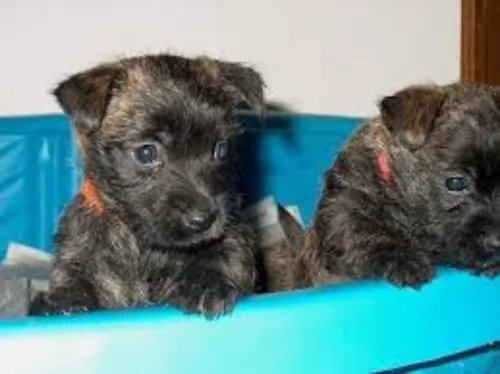 Your Cairland is a tough, feisty little dog and you’re not going to find yourself constantly having to take him to the vet. However even healthy dogs can be affected by ill health, and we look at a couple of illness you want to watch for with your Terrier.
Your Cairland is a tough, feisty little dog and you’re not going to find yourself constantly having to take him to the vet. However even healthy dogs can be affected by ill health, and we look at a couple of illness you want to watch for with your Terrier.
This can be brought on by a change in diet. Usually you can keep food away from your pet for 24 hours, allowing the stomach to empty and to settle. However, if there is blood in the diarrhoea or your dog is vomiting, then veterinary advice must be sought.
Just like humans, a dog can have an allergy to pollen where you see watering of the eyes as well as sneezing. This is because of inflammation of the mucous membranes in the nose. Your vet can ease the problem for your pet.
 The Irish Terrier is a healthy dog breed and you won't find yourself running to the vet often with him, but still he can land up with one of the common dog problems.
The Irish Terrier is a healthy dog breed and you won't find yourself running to the vet often with him, but still he can land up with one of the common dog problems.
It is always wise to be aware of hip dysplasia as this is a disease which can occur in all dog breeds and all dog ages. Also look out for eye diseases such as progressive retinal atrophy and cataracts as these can lead to blindness in your pet.
There is a disease known as cystinuria which is quite a concern with Irish Terriers. It’s an inherited kidney disease where increased amounts of arginine, lysine, amino acids cystine and ornithine are excreted in the urine.
In well-functioning kidneys, blood is filtered so as to create urine. Cystine is reabsorbed back into the bloodstream but with dogs affected with cystinuria they cannot reabsorb cystine back in their bloodstream, causing an accumulation in the urine. Dogs with cystinuria suffer inflammation of the urinary tract and can also develop urinary blockage and kidney failure. Immediate veterinary intervention is required.
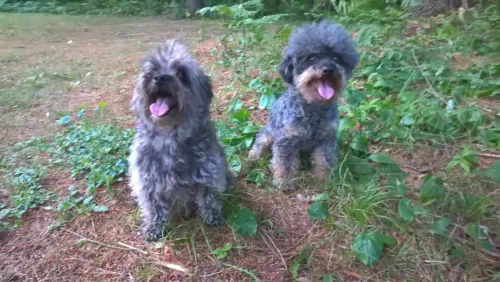 Because the Cairland Terrier is a hybrid breed, the coat can be wiry or soft, but it’s a low maintenance coat. He will need to be brushed twice a week. Some people take their Cairland to have the coat professionally trimmed while others buy a special stripping tool and they strip the hair a couple of times a year.
Because the Cairland Terrier is a hybrid breed, the coat can be wiry or soft, but it’s a low maintenance coat. He will need to be brushed twice a week. Some people take their Cairland to have the coat professionally trimmed while others buy a special stripping tool and they strip the hair a couple of times a year.
Small dogs are prone to dental disease, so you will need to brush your Cairland’s teeth at least two or three times a week. Dental disease is a serious problem with dogs and it won’t only affect the teeth and gums but it can result in infection which can contribute to organ failure. Periodontal disease is always a big problem with little dogs. If you’re not sure how to go about looking after your dog’s teeth, you can always take your dog to the vet for dental check-ups and cleaning.
 The coat of the Irish Terrier requires a brush twice a week to keep it bright. If you intend showing your dog, the coat will need to be stripped a couple of times a year to maintain the texture and color.
The coat of the Irish Terrier requires a brush twice a week to keep it bright. If you intend showing your dog, the coat will need to be stripped a couple of times a year to maintain the texture and color.
Other Irish Terrier owners take their dog to the groomers to have the coat clipped. The dog doesn't shed a lot and they are referred to as being somewhat hypoallergenic.
As with any other dog breed, other grooming needs with your Irish Terrier will include clipping the nails, checking his teeth for plaque build-up and checking inside the ears for infection.
If you're unsure how to perform these grooming procedures with your pet, simply ask your vet who will explain to you precisely how to ensure your dog remains in tip top condition.
He's a fairly active dog so you want to make sure that you are attending to his exercise needs. Take him for a walk every day, and if you've got a good sized garden, throw a ball for him. If you're a jogger you can count him in.
What you feed your Irish Terrier will depend a lot on his age and his activity levels. Every dog is a unique individual and nothing is set in stone regarding their diets. Just like people though, feeding him a lot of junk food will contribute to illness and shorten his lifespan.
He needs quality food. If you buy commercially manufactured food, make sure to read up on how much to feed him. Try and mix in some cooked chicken, brown rice and vegetables from time to time as well as some raw meat.
Learn to know what foods are toxic for him. Make sure he has a bowl of fresh, cool water constantly available to him.